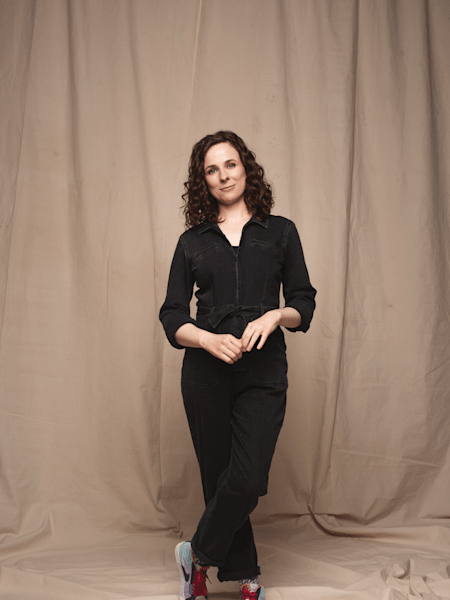Did you explore death or grief in your stand-up or improv work before Griefcast?
Did you explore death or grief in your stand-up or improv work before Griefcast? Yeah, they came up a lot! But they were very hidden. I did character stand-up when I began, and I performed an Edinburgh show that was very successful, but I never twigged that all the characters had dad problems – either dead dads or men who wouldn’t come into the room. I had a character called Andrew who was a seven-year-old stand-up whose dad had run away to Dubai because of some financial fraud. And another character, Alison, was a magician’s assistant whose dad was the magician, but he was in the next room and never came on stage. Afterwards, it was like, “Wow, I stood on stage talking about a man who’d gone into another room that I couldn’t go into, and I always said, ‘He’s gonna come back,’ but he never did.” I mean, psychology 101! So it leaked out, but it was always done in character. I never spoke about what happened in the real world until I started the podcast.
How has your comedy background helped you facilitate conversations about death and grief?
It’s twofold. I’m an improviser at heart – that’s the thing I love doing most. Improv is about connection and listening, so I think 10 years of that accidentally trained me in interviewing. It’s all about building conversations and “yes, and”-ing. The other thing that helped was that, being a comedian, I specifically wanted to talk to other comedians. I didn’t want the show to be too depressing. I wanted to be around other people who would crack a joke when it got awkward or sad. Then it would never be too intense. You’re trying to create a balance and remember that everything is going to be alright. My big goal with the show was that you’d listen to it for an hour and feel better by the end. I didn’t want people to feel worse and more grief-y.
Do you think death and humour are natural bedfellows?
I think they are. Obviously it depends – we all have very different situations and some grief is absolutely tragic. There’s no humour in some losses. But I think grief is an absurd feeling. It’s absurd that you can feel so many emotions at once. It’s absurd that someone can be here and then not be here in a second. It’s a very natural human reaction to laugh at it, because there’s an absurdity to the fact that we exist here and we make this whole world and we live our lives but actually, at any minute, we can stop working. Humour and death go hand in hand. When you laugh, your body takes in loads of oxygen, and I do think there’s a survival aspect to that. Your body is like, “You’re not dead. You’re still here. You’re still alive.” It pulls you back.
What about when we feel guilty or awkward for laughing or finding things funny after the death of another person?
You should be happy about being alive. That’s a brilliant thing. That matters. They don’t get to laugh any more, but you do, and you should feel happy about it. I don’t know a single person who hasn’t had some incident at the funeral or the deathbed or the burial where they’ve absolutely pissed themselves laughing… It’s that thing of laughing at life still existing, things still going wrong, still being late for something. Life is full of these moments, and these things don’t stop happening just because somebody has died. Doctors don’t stop burping just before they tell you someone has died. The cleaner doesn’t stop hoovering right after your parent has died in the room. Life goes on. That’s what the world is telling you: you will laugh again. We feel bad because we think it means we didn’t love that person, but it doesn’t mean that at all.


